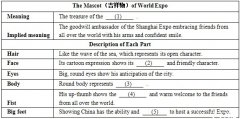四川省射洪中学校高2016级高二下期半期考试
四川省射洪中学校高2016级高二下期半期考试
英语试题
第Ⅰ卷(选择题 共100分)
第一部分: 听力(共两节,满分30分)
第一节(共5小题;每小题1.5分,满分7.5分)
听下面5段对话,每段对话后有一个小题,从题中所给的A、B、C三个选项中选出最佳选项,并标在试卷的相应位置。听完每段对话后,你都有10秒钟的时间来回答有关小题和阅读下一小题。每段对话仅读一遍。
1. How much did these books cost?
A. $32. B. $36. C. $40.
2. Who is the woman probably?
A. Mark' s mother. B. Mark' s teacher . C. Mark's friend.
3. What does the woman want to have?
A. Tea. B. Coffee. C. Water.
4. What is the probable relationship between the speakers?
A. Mother and son. B. Boss and employee. C. Classmates.
5. Why was the woman sad?
A. She made a mistake in the report. B. She had a fight with Carl.
C. Her friend Carl was ill.
第二节(共15小题;每小题1.5分,满分22.5分)
听下面5段对话。每段对话后有几个小题,从题中所给的A、B、C三个选项中选出最佳选项,并标在试卷的相应位置。听每段对话前,你将有时间阅读各个小题,每小题5秒钟;听完后,各小题将给出5秒钟的作答时间。每段对话读两遍。
听第6段材料,回答第6、7题。
6. How long has the man lived there?
A. About six months. B. About twenty years. C. About a year.
7. What is Peter Waters' house like?
A. Old and red. B. New and blue. C. Old and blue.
听第7段材料,回答第8至10题。
8. What does the man need?
A. A taxi. B. A timetable. C. A bag.
9. When will the man leave?
A. At 2:30. B. At 3:00. C. At 3:30
10. What does the man want the driver to do?
A. To help him get prepared. B. To call him in advance.
C. To help him carry his bags.
听第8段材抖,回答第11至13题。
11. Why does the man call the woman?
A. To thank for her dinner. B. To invite her to China.
C. To inform her of his schedule.
12. When will the man go back to China?
A. Tomorrow. B. Tonight. C. The day after tomorrow.
13. How will the man go back?
A. By train. B. By ship. C. By plane.
听第9段材料,回答第14至17题。
14. Why does the woman look pale?
A. She stayed up late last night.
B. She has trouble studying Chinese.
C. She is in poor health.
15. What is the man' s new way to learn Chinese?
A. Making friends with Chinese people.
B. Learning Chinese through songs.
C. Using a Chinese dictionary.
16. What does the woman say she wants to do to improve her Chinese?
A. Work harder. B. Learn from others. C. Join the man.
17. What will the woman bring with her?
A. A Chinese book. B. A Chinese dictionary. C. A CD.
听第10段材料,回答第18至20题。
18. How often does Phil go shopping for groceries now?
A. Once a week. B. Almost every day. C. Once every four days.
19. Why does Phil buy meat at last?
A. Because it is too heavy. B. Because it is easy to get.
C. Because it could stay cold.
20. What can we learn about Phil?
A. He eats cereal for breakfast.
B. He always buys food for a week.
C. He always wastes food.
第二部分 阅读理解(共两节,满分40分)
第一节 (共15小题;每小题2分,满分30分)
阅读下列短文,从每题所给的四个选项(A、B、C和D)中,选出最佳项,并在答题卡上将该项涂黑。
A
Welcome to the Electronic Village to explore new ways of language teaching and learning.
|
Electronic Village Program (Thursday, June 18, 2015) |
|
|
Nearpod 9:00 a.m. to 10:00 a.m. Room 501 Nearpod is a software program that creates a rich context (语境) for students to learn vocabulary. The presenter will show how to use it. |
TEO 2:00p.m. to3.00p.m. Room 502 Our students come from different backgrounds but have the same desire to learn online. The presenter will use examples from his first online class to explain how any teacher can begin teaching online with TEO. |
|
Kahoot 10:30 a.m. to 11:30 a.m. Room 601 Kahoot software can be used to create grammar tests which can be graded on a network. It can provide students with instant feedback (反馈) , including reports about their strengths and weaknesses. |
Prezi 3:30p.m. to4:20p.m. Room 602 Uses of prezi in listening and speaking courses draw students' attention to speaking more fluently. The presenter will show how students can use Prezi to confidently present on a variety of topics, including introducing family, friends, and hobbies. |
21. Nearpod can be used to .
A. offer grammar tests B. teach listening online
C. help vocabulary learning D. gain fluency in speaking
22. If you want to improve your speaking skills, you can go to .
A. Room 501 B. Room 502 C. Room 601 D. Room 602
23. A teacher who wants to learn online teaching is expected to arrive by .
A. 9:00 a.m. B. 10:30 a.m. C.2:00 p.m. D. 3:30 p.m.
B
At thirteen, I was diagnosed (诊断) with a kind of attention disorder. It made school difficult for me. When everyone else in the class was focusing on tasks, I could not.
In my first literature class, Mrs. Smith asked us to read a story and then write on it, all within 45 minutes. I raised my hand right away and said, "Mrs.Smith, you see, the doctor said I have attention problems. I might not be able to do it."
She glanced down at me through her glasses, "You are no different from your classmates, young man."
I tried, but I didn't finish the reading when the bell rang. I had to take it home.
In the quietness of my bedroom, the story suddenly all became clear to me. It was about a blind person, Louis Braille. He lived in a time when the blind couldn't get much education. But Louis didn't give up. Instead, he invented a reading system of raised dots (点), which opened up a whole new world of knowledge to the blind.
Wasn't I the "blind" in my class, being made to learn like the "sighted" students? My thoughts spilled out and my pen started to dance. I completed the task within 40 minutes. Indeed, I was no different from others; I just needed a quieter place. If Louis could find his way out of his problems, why should I ever give up?
I didn't expect anything when I handed in my paper to Mrs. Smith, so it was quite a surprise when it came back to me the next day--with an "A" on it. At the bottom of the paper were these words: "See what you can do when you keep trying?"
24. The author didn't finish the reading in class because .
A. he was new to the class B. he was tired of literature
C. he had an attention disorder D. he wanted to take the task home
25. What do we know about Louis Braille from the passage?
A. He had good sight. B. He made a great invention.
C. He gave up reading. D. He learned a lot from school.
26. What was Mrs. Smith's attitude to the author at the end of the story?
A. Angry. B. Impatient. C. Sympathetic. D. Encouraging.
27. What is the main idea of the passage?
A. The disabled should be treated with respect.
B. A teacher can open up a new world to students.
C. One can find his way out of difficulties with efforts.
D. Everyone needs a hand when faced with challenges.
C
As Internet users become more dependent on the Internet to store information, are people remembering less? If you know your computer will save information, why store it in your own personal memory, your brain? Experts are wondering if the Internet is changing what we remember and how.
In a recent study, Professor Betsy Sparrow conducted some experiments. She and her research team wanted to know how the Internet is changing memory. In the first experiment, they gave people 40 unimportant facts to type into a computer. The first group of people understood that the computer would save the information. The second group understood that the computer would not save it. Later, the second group remembered the information better. People in the first group knew they could find the information again, so they did not try to remember it.
In another experiment, the researchers gave people facts to remember, and told them where to find the information on the computer. The information was in a specific computer folder (文件夹). Surprisingly, people later remembered the folder location (位置) better than the facts. When people use the Internet, they do not remember the information. Rather, they remember how to find it. This is called "transactive memory (交互记忆)"
According to Sparrow, we are not becoming people with poor memories as a result of the Internet. Instead, computer users are developing stronger transactive memories; that is, people are learning how to organize huge quantities of information so that they are able to access it at a later date. This doesn't mean we are becoming either more or less intelligent, but there is no doubt that the way we use memory is changing.
28. The passage begins with two questions to .
A. introduce the main topic B. show the author's attitude
C. describe how to use the Internet D. explain how to store information
29. What can we learn about the first experiment?
A. The Sparrow's team typed the information into a computer.
B. The two groups remembered the information equally well.
C. The first group did not try to remember the information.
D. The second group did not understand the information.
30. In transactive memory, people .
A. keep the information in mind B. change the quantity of information
C. organize information like a computer D. remember how to find the information
31. What is the effect of the Internet according to Sparrow's research?
A. We are using memory differently.
B. We are becoming more intelligent.
C. We have poorer memories than before.
D. We need a better way to access information.
D
Once there was a young farmer who had an appointment with his lover to meet under a big tree. He was short-tempered and came very early. It was a fine spring day with flowers in full bloom (盛开) , but he wasn't in the mood to enjoy it.
Suddenly an angel turned up before him. "You get impatient, don't you?" said the angel. "If you don't want to wait, just turn the button to the right. You can jump over any life period if you want to."
The young fellow was so happy that he turned the button lightly. How amazing! His lover appeared before him immediately, staring at him with love. How wonderful it would be if the wedding ceremony were held now! He, again, turned the button. A grand wedding appeared in front of him; the band was playing cheerful music; he lost himself in it deeply. Unknowingly, the desires in his heart appeared endlessly: I also want a big house. He turned the button. I also want a crowd of lovely children. Instantly a group of lovely kids were playing joyfully in the large living room. Again, he jumped at turning the button to the fight more than half.
How time flies! Before he saw the blooming flowers in the garden, everything had been covered in a deep snow. Looking at himself again, he had already become so old, his hair and beard totally white.
He was filled with regrets: I'd rather spend my life step by step than go in such a hurry. Better let me wait patiently! The button moved to the left with a rush. Once again, he was waiting for his lover under that big tree. His restlessness disappeared completely.
32. The angel gave the farmer a magic button in order to .
A. make an appointment with him B. shorten his future time
C. help him enjoy beautiful flowers D. change his temper
33. Which of the following things didn't the farmer enjoy alter using the button?
A. A satisfying wedding. B. A happy family.
C. Splendid music. D. Blooming flowers.
34. What does the underlined word "restlessness" in the last paragraph mean?
A. Eagerness. B. Hopelessness. C. Impatience. D. Amazement.
35. What can we learn from the story?
A. Life can't skip forward. B. Lovers had better wait.
C. People should live a realistic life. D. Regrets may exist if life is not fun.
第二节 (共 5 小题,每小题 2 分,满分 10 分)
根据短文内容,从短文后的选项中选出能填入空白处的最佳选项,选项中有两项为多余选项。
The Internet has opened up a whole new online world for us to meet, chat and go where we’ve never been before.
But just as in face to face communication,there are some rules of behavior that should be followed when online. The basic rule is simple: treat others in the same way you would want to be treated. 36 . For anything you’re about to send: ask yourself, “Would I say this to the person’s face?” If the answer is no, rewrite and reread. 37 .
If someone in the chat room is rude to you, your instinct (本能) is to fire back in the same manner. But try not to do so. 38 . If it was caused by a disagreement with another member, try to fix the situation by politely discussing it. Remember to respect the beliefs and opinions of others in the chat room.
39 . Offer advice when asked by newcomers, as they may not be sure what to do or how to communicate. When someone makes a mistake, whether it’s a stupid question or an unnecessarily long answer, be kind about it. If it’s a small mistake, you may not need to say anything. Even if you feel strongly about it, think twice before saying anything. Having good mariners yourself doesn’t give you license to correct everyone else. If you do decide to tell someone about a mistake, point it out politely. At the same time, if you find you are wrong, be sure to correct yourself and apologize to those that you have offended.
It is not polite to ask others personal questions such as their age, sex and marital status. 40 , don’t ask such questions.
A. It’s natural that there some people who speak rudely or make mistakes online
B. Repeat the process till you feel sure that you’d feel comfortable saying the words to
the person’s face
C. Everyone was new to the network once
D. Imagine how you’d feel if you were in the other person’s shoes
E. When you send short messages to a person online, you must say something
beautiful to hear
F. You should either ignore the person, or use your chat software to block their
messages
G. Unless you know the person very well, and you are both comfortable with sharing
personal information
第三部分:英语知识运用(共两节,满分45分)
第一节 完形填空(共20小题;每小题1.5分,满分30分)
阅读下面短文,从短文后各题所给的四个选项(A、B、C和D)中,选出可以填入空白处的最佳选项,并在答题卡上将该项涂黑。
It was anniversary and Ria(wife) was waiting for her husband(Manoj) to show up. After some years of 41 , things changed between them. The once cute couple who couldn’t live 42 each other were now fighting over every little thing. Even so, 43 hoped that changes came into their marriage.
As the door bell rang she ran toward the door and opened it with a smile and a bunch of flowers to greet her husband. She wanted to make up for 44 , preparing champagne(香槟) and light music to 45 .
Suddenly the phone in the bedroom rang. Ria went to pick it up. On the phone there was a man who said, “Hello, madam. I am 46 from the police station. Is this Mr. Manoj’s number?” She replied, “Yes it is!”
“I am sorry, madam but an 47 happened this afternoon and a man died when he got off the bus. We got this number from his wallet. Can you please come and identify the 48 ?” the man replied.
Ria was 49 ! “How could this happen? Manoj is just with me here!”, she replied. Ria almost lost her 50 . She had read stories about 51 returning to meet their loved ones after their death before they 52 . Her heart 53 . In 54 she ran towards the other room to look for her husband. But he was not there.
She said to herself, “It’s 55 ! He left me forever. Oh God, I can die to have another chance to 56 for every fight we had. I lost my chance forever.” She fell on the floor in pain.
Suddenly there was noise from the bathroom, the door opened and Manoj came out and said, “Darling, I forgot to tell you today my wallet was 57 .”
Life might not give you a(n) 58 chance, so never waste any moment while you still have one. 59 people and relations in life and have a wonderful life with no 60 . Live today and enjoy every moment of life because no one have promised Tomorrow.
41. A. effort B. marriage C. doubt D. appointment
42. A. without B. for C. with D. on
43. A. both B. he C. she D. neither
44. A. apologies B. discussions C. fights D. bargains
45. A. date B. express C. celebrate D. blame
46. A. calling B. escaping C. suffering D. coming
47. A. battle B. construction C. match D. accident
48. A. number B. present C. body D. wallet
49. A. satisfied B. shocked C. exhausted D. relieved
50. A. interest B. husband C. consciousness D. body
51. A. souls B. shadows C. images D. footprints
52. A. sleep B. fly C. respond D. leave
53. A. beat B. sank C. stopped D. disappeared
54. A. fear B. secret C. turn D. delight
55. A. wonderful B. late C. untrue D. true
56. A. prepare B. search C. mend D. blame
57. A. broken B. stolen C. repaired D. opened
58. A. second B. single C. just D. third
59. A. Use B. Many C. Value D. Teach
60. A. regrets B. diseases C. records D. belongings
第II卷(非选择题 共50分)
第二节 语法填空(共10小题;每小题1.5分,满分15分)
在空白处填上适当的内容(不多于3个单词)或括号内单词的正确形式。(请将答案写在答题卷上)
阅读下面材料,在空白处填入适当的内容(不多于3个单词)或括号内单词的正确形式。
Learning to speak English well may be the best thing you can do to improve your life. That's right. Almost all international conferences and competitions 61 (conduct) in English. Diplomats(外交官) and politicians from different 62 ( country) use English to communicate with each other. If you can communicate in English, you can:
Contact people from all over the world. Talk about your ideas and opinions on the Internet discussion groups. Send e-mail to 63 . Learn about their life and culture
Travel more easily. Communicate with people 64 you go ----English is spoken in more than 100 countries. Introduce yourself, have a conversation, or ask for help.
Push your career forward. If you want 65 good job in business, technology, or science, get out of that armchair and set out 66 (learn) English now!
Knowing English will let you:
Gain technical knowledge. English is the language of technology, 67 (especial) high technology like computer science, genetics (遗传学),and medicine. If you're going to read about technology, you'll probably have to do it 68 English
Be a world-class business people. It's simple. International business is done in English .And all business today is international . So if you want to run a business, you have to know English to contact other business people, go to conferences, 69 read international business newspapers and magazines, etc.
Use your computer more effectively. Most computer applications are in English, so you will understand them 70 (well) and become a better employee.
第四部分 写作(共两节,满分35分)
第一节 短文改错(共10小题,每小题1分,满分10分)
假定英语课上老师要求同桌之间交换修改作文,请你修改你同桌写的以下作文。文中共有10处语言错误,每句中最多有两处。每处错误仅涉及一个单词的增加、删除或修改。
增加:在缺词处加一个漏字符号(∧),并在其下面写出该加的词。
删除:把多余的词用斜线(﹨)划掉。
修改:在错的词下划一横线,并在该词下面写出修改后的词。
注意:1.每处错误及其修改均仅限一词;
2. 只允许修改10处,多者(从第11处起)不计分。
Our class visited the Museum of the Anti-Japanese War. Before our school bus arrived in the Museum, we got off and entered in line. The moment we were in the exhibition room, we were attracted by the picture and descriptions about the war above the wall. Some students took notes while others had a little discussion. We were shocking at the cruelty of the war. Then we gathered in another room and listened an old soldier telling the stories about the war. Then we had a better understanding of the history. Before we left, we all came to the front of the museum and took a picture with the old soldier in the memory of his visit. We hope by visiting the museum more people can remember that happened in the war and treasured our peaceful life.
第二节:书面表达(共25 分)
假定你是星光中学的高中毕业生李华,母校将为高一新生举办主题为“What to learn in senior high school? ”的英语沙龙活动,特邀请你结合自身经历谈谈自己的体会。请根据以下提纲准备一份英语发言稿。
学会学习:方法、习惯等;
学会做人:真诚、友善等;
其他方面:考生自拟。
注意:1.词数100左右;2.发言稿开头和结尾以给出,不计入总词数。
Good morning, everyone! It is my honor to share with you my opinions on what to learn in senior high school.___________________________________________________
Thank you!
四川省射洪中学校高2016级高二下期半期考试
英语答案
听力 1-5 AACAB 6-10 BAABC 11-15 ABCAB 16-20 CBBCA
阅读21—23 CDC 24—27 CBDC 28—31 ACDA 32—35 BDCA
36-40 DBFCG
完形41—45 BADCC 46—50 ADCBC 51—55 ADBAD
56—60 CBACA
语法填空
61. are conducted 62. countries 63.them 64. wherever 65. a
66. to learn 67. especially 68. In 69. and 70. better
短文改错
1.before------when 2.Inthe museum-------at…. 3.picture------pictures
4.above-----on 5.shocking----shocked 6. Listened----listened to
7.in the memory of ----in memory of 8. his----our 9. that-----what
10. treasured-----treasure
书面表达
One possible version:
Good morning, everyone! It is my honor to be here to share with you my opinions on what to learn in senior high school.
In the coming three years, senior school life will be challenging. Firstly, you should know how to learn efficiently. Personally, I used to try effective methods to achieve my academic goals. Developing a good habit is also of importance. It really benefited me a lot to preview lessons, get actively involved in class, and review what had been taught after class.
In addition, we should learn how to get along well with others. In school, I respected teachers and was friendly with classmates. It was with sincerity and faithfulness that we created harmonious atmosphere.
Finally, we should take part in sports and outdoor activities frequently. They were really helpful to build up my body and enrich my school life.
No pains, no gains. I am sure that with you great efforts, you will enjoy a colorful and fruitful life here.
Thank you!




